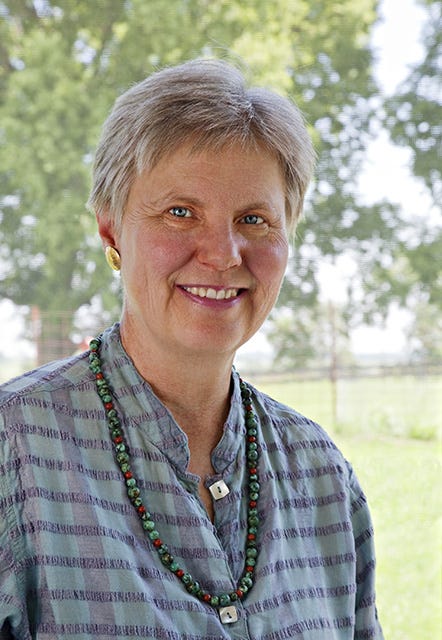
The Yoder children were all barefoot when they circled around the car that was over-turned in the ditch.
Minutes earlier, I had been driving behind the blue car, slowly, very slowly, making its way down the blacktop road. Summer is peak tourist time in Buggy Land when people from the surrounding cities arrive here for a day or week-end to buy a homemade shoo-fly pie or take a tour of local sites—the bakery, the blacksmith, or the furniture-making shops. Others forgo the Chamber of Commerce’s mini-bus circuit and attempt to sightsee on their own. Quickly, they learn that back country roads aren’t always easy to navigate.
Some tourists have never been on a gravel road in their lives. They become lost in the clouds of dust their cars generate.
Other drivers are equally unfamiliar with blacktop roads and the harm a horseshoe nail can do to your tires. All of the drivers think that their GPS will take them wherever they want to go, and when it lands them on a dead-end muddy, mucky B level road, they struggle to stop and ask directions. They strain even harder to understand what we’re telling them. North? South? East? West?
I’ve been behind tourists who had suddenly stopped dead in the middle of the road and backed-up, driven in the wrong lane, passed buggies on hills, made hasty U-turns, and a whole host of other things not included in the Iowa DOT Driver’s Ed Manual.
So when the blue car in front of me started weaving across the blacktop toward the ditch, I stayed several car lengths behind it. Then bam, the car drove right off the road and landed on its side on the steep slope. Holy smoke, I thought, that has to be someone having a seizure or a heart attack. I’d never seen a tourist do anything that dumb!
I pulled up behind the blue car, put on my flashers, and hopped out, tapping on the window. Two women were in the front seat, crying, tears running down their faces. Two children were screaming in the backseat.
“Are you hurt?” I yelled through the glass.
The woman in the front passenger’s seat shook her head, explaining that they couldn’t get the windows rolled down nor the doors open. I worried that if they tried to pry open a door and shifted their weight toward the ditch, the whole car might topple over on top of them.
“Stay put,” I said. “I’ll get you help.” Fortunately, it wasn’t a hot day and they would be okay inside the car for a few minutes.
I headed back to my car, moans and cries rising from the vehicle in the ditch.
Just then the goat milk truck pulled over. I explained the situation and told the driver I was headed to get help from the Yoders in the farmhouse on the corner.
“That’s just where I was going,” the milk truck driver said, taking off toward Yoder’s milking parlor where he knew he would find Samuel.
More cries from the ditch.
“Are you sure you’re okay?” I called through the glass. “I can call an ambulance.”
“No, it’s just so stupid,” the driver said. “I thought I was on the shoulder of the road.”
I tried to follow that logic. The intense rain and heat of the past month had pushed every growing thing to new heights. Three-foot-tall brome grass grew right up to the road’s edge. Maybe the driver thought it was obscuring a turning lane? Who knows?
“Where are you from?” I called through the glass.
“Cedar Rapids.”
“Out for a day trip?”
The women nodded their heads, then their moans turned to wails.
“Now, don’t you worry. You’ll be okay. You’re going to be all right. We’ll have you heading back to Cedar Rapids before you know it.”
But I was beginning to doubt my own words. Where was Samuel? Did the milk truck driver find him? He should have been here by now.
I ran down the road to the Yoders.
The Yoder children were playing in the graveled circulate drive, their bare feet covered with dust.
“Where’s your dad?” I asked the oldest daughter, the only child who had been to school and had learned to speak English. The Amish speak a German dialect at home with their children learning English when they start kindergarten.
“Don’t know,” she said. “Mom’s in the house.”
I threw open the screen door and found Emma Mae in the kitchen.
“We have a bunch of tourists stuck in the ditch,” I began, but just then Samuel rounded the house in his tractor, a vintage John Deere without rubber tires. Samuel, like most Old Order Amish, drove on the rims.
Hurriedly, we were all circling the car in the ditch. The two tourist children had pried their door open and the adults were crawling into the backseat to make their exit. The four Yoder children were taking in the site, walking around the car, peering underneath, surveying the wreck from every angle, their feet sinking into the tall grass. The Yoders stared at the tourists.
The tourists were almost hidden in the weeds, their children still holding their devices in their hands. The tourists stared at the Yoders, taking in their straw hats, suspenders, homemade clothes, and bare feet.
No one said a word.
Samuel wrapped a chain around the car’s back bumper and tried to carefully tip the car over and pull it back on the road. But it was a no-go. The car wouldn’t budge and Samuel thought he might do more harm than good.
“We’re going to have to call Ready-To-Go Wreckers,” Samuel said.
I pulled out my phone and got Dan, a Mennonite neighbor on the line.
“I’ll be out in about ten minutes,” Dan said.
“Why don’t we wait under the tree across the road at our place,” Emma Mae said, and we all wandered over to the shade of the branching silver maple. The driver of the blue car was still sobbing. I put my arm around her and told her to take some deep breaths. Her children cried right along with their mother.
“You’re going to be all right,” I repeated. “Dan will be here soon with the tow truck.”
Suddenly, the four Yoder children dashed across the yard to the barn. They each returned with small brown cavapoo puppies in their arms. The dogs had the large, floppy ears, and big brown eyes of the spaniel, but the curlier hair of the poodle.
The Yoder children dropped the puppies at our feet. The pups spun around and around under the tree, exploring, feeling out the new place. I picked one up and hugged it to my chest. The Yoder children put a puppy in each of the English children’s arms, then they passed two to the tourist parents. The puppies licked the children’s faces and snuggled into the crook of the women’s elbows.

Faces calmed. The crying stopped. The danger and embarrassment of losing control in a strange place in front of strange people gradually began to release. Two very different families, one urban, the other rural, came together at this moment, children helping children, adults helping adults.
Dan arrived in the tow truck, and after assessing the situation, he brought out a winch. Dan’s partner crawled into the car, and between the two of them, they flipped the car back on all four wheels, and then drove it out of the ditch.
Dan said the whole thing came to $218.00. The driver took a deep breath and pulled out her credit card, the Amish blinking in disbelief at the cost.
Then the driver threw her arms around me. “Who are these people?” she asked.
“These are the Yoders,” I said.
The tourists hugged the puppies a final time.
“I’m just so mad at myself,” the driver said. “What a silly thing to do.”
“Well, if you were going to drive into the ditch, you picked the right neighborhood.” I told her, placing my pup’s four paws solidly back on the ground.
Read more about Mary Swander, her books, and touring dramas:
All the proceeds from Mary Swander’s Buggy Land paid subscriptions, go to AgArts, a non-profit that imagines and promotes healthy food systems through the arts.
Donate any amount to AgArts here:
I am pleased to be a member of The Iowa Writers Collaborative. Check out our Sunday Round-Up and support the work of the members:






Smiles and tears! Also I am reading and loving Heaven-and-Earth House. It is my lectio divina every morning.
What a heartwarming story! ❤️